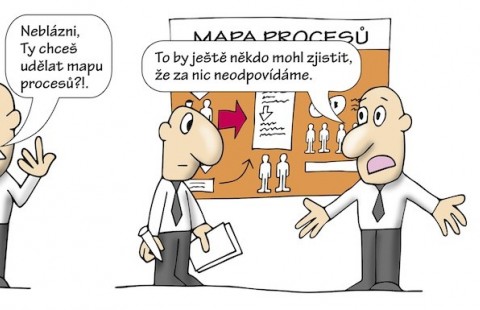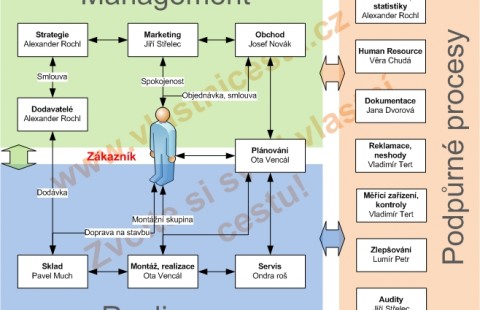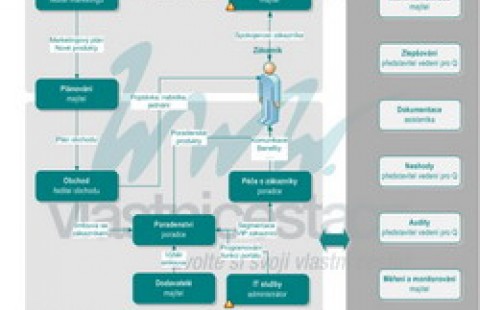The non-verbal communication largely does not tend to be the cause of bad communication. More likely, it discloses the communicator´s current stance on the given subject. Ineffective communication in companies is caused be other phenomena. After more than 7 years of organizing training sessions in active communication, we have identified 3 principal causes of bad communication.
For years, I have been organizing training and courses in communication where employees as well as managers can find their own way to effective communication in their own companies. Most of the participants are people who have been in a communication training before. They are all increasingly aware that it is precisely communication that will determine their results and the company´s success. People quite often remember from their previous courses how great the effect of non-verbal communication is. Indeed, it can undermine the entire speech. Nevertheless, it can never make a substitute for erroneous information, wrong judgement of a situation, a failure to provide important information and so on. I have often seen that if a worker prepares well and submerges into his or her subject fully, their gestures and mimics are in line with their interest and by no means disturb the speech. The final result is, thus, much better than when they do not have the facts right. Even very strong jitters then will not cause the audience to express their disapproval. We are all nervous at critical moments. It is precisely at those moments when our habits and particularly preparation will prevail.
Today I have focused on the most common causes of bad communication. They are no hoaxes. Communication is not about hoaxes, how to trick somebody into believing something that is not true; it is, however, about how to communicate important information in such ways and forms as are adequate for the situation and the audience.
Poor preparation
Poor preparation ranks among the most frequent causes of failure. Workers are used to prepare for a meeting, for instance. They get ready a list of assignments, questions they want to ask, basic information about their own project and that is it. What they grossly underestimate is how and when to communicate the prepared information. You have to prepare for effective communication:
- prioritize information - which information is absolutely essential and will serve as a basis for actions. Utilize the communication principle: must - should - could. Important information is usually unpleasant, so people naturally tend to push its communication back in time.
- what information when - what is the first to communicate, what is the second and what is the last. The wrong order might cause you fail to get to the other information items or they might not be logical and so on.
- message that the audience understand - I should use words that correspond with the language and - in particular - the knowledge of the audience. My knowledge of foreign or modern words may not be automatically appreciated by the audience, or such words may be misunderstood.
- what the audience should remember - what the emphasis will be laid on, how many times an information item should be communicated or how it should be visualized so that the others can remember it and work with it.

The Real | Interim Manager for Your Changes

Manager work model

Time management - making use of time effectively

Jak správně tvořit mapu procesů

Modelling and setting the processes and procedures - ISO 9001

Training - preparation of the SWOT analysis and strategy

Company Management System of Quality Step by Step - ISO 9001

Process map acc ISO 9001 - business offer

IT staff communication
Do not look for communication finesse or tricks, you had better prepare well instead. An intelligent listener appreciates all those who strive to capture the essence of the subject, with the result and tricks having a minimal or zero effect on them.
Unfamiliarity with the subject - forgetting about the fundamentals
I have to have elementary knowledge of each subject I want to deal with. Precision and usage of appropriate facts, knowledge of the sense and the fundamentals of the communicated subject all make communication easier and faster. For instance, it does not suffice to know that the 5S method means order in the workplace. You need to know that the essence of the method is the effectivity of work, curtailment of the idle time, elimination of the search for tools or information. Plus, you need to know facts or be able to calculate that office workers spend the minimum 5% of their working time searching for information, which represents 8,25 hours a month and 99,0 hours a year.
Let us take IT policies as an example. You can communicate what instructions the user has to follow (change the password monthly, do not use USB flash discs, do not install unapproved SW, etc.). If you deliver these instructions just as facts users have to memorize and there will be lots of them, you will be getting excited in the coming months as the users will not be following them. Chances of users following them will be greater, if they understand the principle idea of these safeguards.
Let us take management as another example. If I cannot distinguish among terms like process - project - development process, I can hardly assign objectives and set assignments to the process owner or the project manager.
My recommendation here is to come to a halt sometimes, go back to square one and complete the preparation. Thus, you will spare yourselves the trouble of subsequent explaining away and resolving situations that have arisen through needless misunderstanding.
Unforeseen reactions - shallow thinking
Thinking over just what I have to say is not enough, I also have to anticipate what the other party will perceive and understand. Seemingly, it surely suffices to say a few sentences. Sentences that instantly come to your mind. “Franky, clean up that mess on the desk, so that the boss does not see it and the auditors do not get excited, will you?” It looks like a problem correctly solved. But only provided we look into the problem from our own point of view - the speaker´s point of view. However, the listeners mostly see things differently. After all, they keep their workplace in order. They have there everything they need to work with and some 5S from Japan does not interest them. From their point of view, such a sentence communicated without depth can be just another needless task or even bugging from the side of the boss. And that is disregarding the fact that in the above sentence you have put all the blame on the boss and the auditor, so the true meaning of order in the workplace has vanished.
Judging correctly the worker´s reaction requires at least the following:
- being aware of the current situation - what is the worker´s condition (they have 40 hours of overtime each month, they are finalizing an important project, …), what the management´s approach towards the given subject is (is 5S a priority to serve the people or is it regarded as an order from the top ....)
- the listener´s attitude - does he or she understand the benefits of 5S which is supposed to save their time and help them get oriented at the work they are currently doing? When they see the positive aspects of 5S is not the same as when they refuse to let others interfere with their own self-styled pose etc.
- potential counterarguments - what will the worker´s counterargument to your sentence “order will cut short the time needed for looking for the necessary source materials” be? It may be “I am intelligent, I do manage chaos” or “it is all the image bullshit, it is not true”. Your reaction will be dependent of one of the two counterarguments.
Our preparation should include at least a contemplation over what might the listener´s reaction to our statements be like. At times, it takes only 5 seconds, and if the meeting is important it is adviseable to draw a colleague in as an impartial consultant.
Effective communication
We all communicate throughout our lives. To think I will surely find myself an excuse for each situation is possible, though not recommended. Reaching the best results requires preparation, training and also knowing my self - how I am going to react in various situations. Sadly, every situation we might get into is a little different each time. The more situations we have been through and successfully finalized, the more possibilities that potentially lead to success we know, and, likewise, the better our communication/presentation skills and habits get. Our recommendation sounds like this - Train communication, fewer challenging situations will take you by surprise unprepared.
Do you know what phrase would be more appropriate to use when telling Franky to clean up the mess on his desk? If you do, please type your suggestions into the discussion box for me and the other readers.


